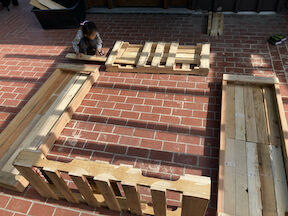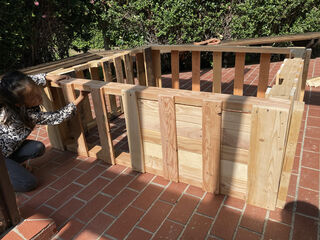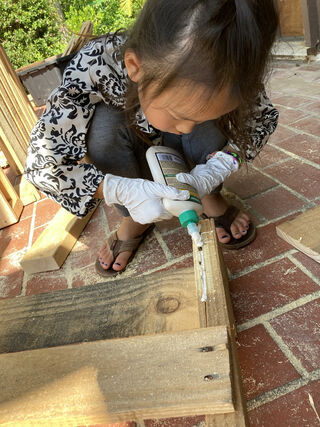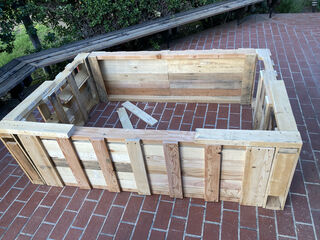Child Development
Can Being Your Kids' Math Teacher Really Be Fun?
Let's share examples of what we've learned as parents teaching our kids.
Posted June 27, 2020
No one cares how much you know, until they know how much you care. —Theodore Roosevelt
If you recall your childhood need for homework help in math, it may reflect experiences with your own children. Having taught algebra for five years, and parented two children during those years, I can totally commiserate if parent-child math homework experiences are not our best moments. One moan I particularly recall, “My teacher does not do it that way.”

Cool family math to ignite learning
My friend, Vu Le, is a lifelong learner who loves to explore, learn, share, play, and play, and create. Vu and Ann share parenting goals of supplying their kids with tools so that they can challenge themselves in a productive way. This has become an additional full-time job for them with the demands of remote learning.
The goal for their three girls, Emmi Anna, age 8, Cali Ann, 7, and Lani Ava, 3, is to "maintain the fun aspect of learning so they will be being interested, curious learners and informed citizens throughout their lives."
The family, guided by things the kids love, have become adventures, explorers, kid-campers, all the while boosting math and wisdom in their real-world experiences. For example, as they bike around town, they discover free, discarded pallets and other building material. They take photos, write down notes, draw maps, and then come back with dad in the truck to retrieve their treasured finds. With this material, they embark on a construction project—this time, perhaps a garden box.

Mathematical thinking ignited from discarded wood
The Le family ideas for your kids' virtual garden box incorporates a lot of math. The kids have the freedom of planning. With chalk marks on the ground or tape outlines on a floor, using the dimensions of their choices, they can plan all the options and "angles." It may not work out when they want the box to measure 1000 feet by 100 feet, but they develop resilience when they make predictions, adjust with trial and error, and recognize mistakes as learning opportunities. The steps from idea to actualization provide many instances for insights.
These include:
- Planning stages from paper to actual for the length/width
- Evaluating their designed area
- Getting the measurements right. Is a foot measured related to a person's foot? What is a square foot? They can even make a square different from each other's by drawing their foot and transforming that vague rectangle into a square. Using those to connect with what "square foot" means allows each to have a different way of calculating.
- Comparing sections of the plot for graphing it onto their architect graphing paper ... discovering ratio, proportion, percentage
- Confronting metric measurement when needing tools using metric sizes
- Enhancing technical skills along with the executive function skills of planning, prioritizing, risk assessment, as they are guided to sand, varnish, paint, cut, and construct their pallet wood into their planter box.
- Planning/planting selecting which plants then, as they grow, measuring the height of the plants, graphing (is it linear or logarithmic?)

What's next for the Vu girls? "With the garden box, they will next learn about composting, read about different plants/seeds and requirements to see if suitable for growing here in our community. This might even overcome any fear of handling worms! After we build this garden box, the next project will be a kid/dog playhouse out of used materials from our dumpster diving sessions."
Explorers and virtual surfers
I was delighted to hear the girls have been sleeping out of a tent in the backyard these months, but assumed it was with a parent in the tent with them. The idea was for them to really do the camping without a full-time parent companion. Vu said, “We enjoy family camping trips, but at home it's only the three girls and one of the three dogs that sleep in the tent. We get their campfire going, they take turns reading around it, say their goodnights to us and then head to their tent, and then snooze time. In the morning, the sisters work together to break down the tent, they set up the previous evening, as a team."
Although the surfing is virtual, they eagerly join the game of beach math, using waves, pebbles, and seashells, and might record how many waves are in a set, and if you have five sets then how many waves have passed, etc. If they get the questions correct, then they get to learn and practice land-based surfing skills on boards. The surfing is also real, as they go out in the water.
Opportunities and sanity-savers as a parent-teacher
When I remarked that it must take a lot of time and work to be such dedicated parent/teachers, Vu said he is doing things he really enjoys. That is a good point. If you think of things to do with your kids, start with something you already like.
You want to avoid times like when you started an extensive exercise, regimen, very strict diet, frequently meeting book club, or other time commitment and found yourself dreading when it was time to keep following through. That is a normal brain response to something unpleasurable, frustrating, and requires intense effort. To get your brain (and theirs) to engage and stay motivated learning experiences, even though setbacks or mistakes, you all need to desire the experience and goals.
It does not have to be surfing or construction projects to get your child interested in a learning practice. You know what you and your kids enjoy (juggling, magic tricks, robots, machines, dinos, insects, etc.). Those common interests will guide you to opportunities in which to embed their academics into meaningful real experiences.
Teacher appreciation and parental guilt
As time goes on and we continue to actively take on the job of teaching our children without full-time classroom learning, we are gaining a new appreciation for the professional skills of their teachers' professional skills, dedication, and determination. (Let them know.)
At another level, parental fears with concerns like, "What if I didn't help them enough and they are not ready for school?" or "If I, or they, are watching TV or playing on computers and cellphones, I feel guilty. I think I should be doing something learning-related with them, but I need a break."

The good news is that any time learning together with pleasure will build a foundation that will promote their success as they continue with you and in the classroom. Don't be hard on yourself. The brain's neuroplasticity (construction of memory networks from learning, experiences, and practice) will let them catch up on assignments you "didn't get" or they "didn't 'get'" from you.
Be flexible. Laugh about mistakes then dig back in. Celebrate successes, even very small.
Let's share what works in our creative parent-as-teacher learning experience
As I have shared examples here of what I've learned from parents' creative strategies, I invite you to share (in the comments section below) ideas you've tried or heard about. We can all use inspiration to connect our kids, and ourselves, to the joys of learning together.




